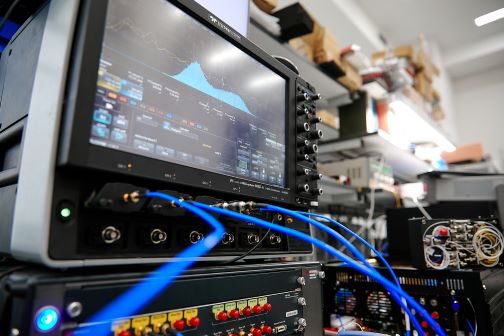Scientists have developed an algorithm that improves photon detection efficiency in quantum key distribution (QKD) systems.
Quantum key distribution is a super-secure method of encrypting information, designed to eliminate the possibility of its leakage or hacking by digital means. When a key – the “instruction” for encrypting and decrypting information – is transmitted, quantum uncertainty is activated, making interception of the key by existing hacking tools theoretically impossible.
Scientists explain that one of the core quantum key distribution (QKD) devices is a single-photon detector (SPD), a detector that registers ultra-low intensity light.
“The problem is that many papers on detectors have not paid enough attention to analysing the impact of gating voltage parameters on the SPD's performance. In our work, we show that even seemingly insignificant detector control parameters can make a significant contribution to the performance of both the detector itself and the SPD system as a whole”, said Anton Losev, a researcher at the NUST MISIS’ NTI Centre for Quantum Communications.
The study showed a strong effect of the amplitude of the alternating gating voltage on the functional parameters of SPDs. According to the scientists, it was possible to formulate universal recommendations to improve the performance of SPDs with sine gating. The study results were published in the IEEE Photonics Journal.
Employees of the NTI Centre for Quantum Communications at the National University of Science and Technology “MISIS” believe that the key to properly solving the problems of quantum technologies is the versatility of scientists, who act alternately as engineers, software developers, laboratory technicians and mathematical modelling theorists.
“We believe that the unique conditions of our research centre allowed us to conduct a correct experiment and develop an effective algorithm for optimising the SPD. At the NTI Centre Quantum Communications, we perform measurements automatically on a special stand we developed that features unique control and measurement results processing system”, said Vladimir Zavodilenko of the NTI Centre for Quantum Communications at NUST MISIS.
The scientific team plans further research in investigating the “delayed avalanche” effect in the SPD, which they also identified in the study. This effect locks the detector in a certain position, which affects the overall error rate of the SPD system and, consequently, the resulting lower rate of quantum key generation.
Earlier, it was reported about the launch of the first ecosystem-based open access quantum network between the campuses of the National University of Science and Technology “MISIS” (NUST MISIS) and the Moscow Technical University of Communications and Informatics (MTUCI).
